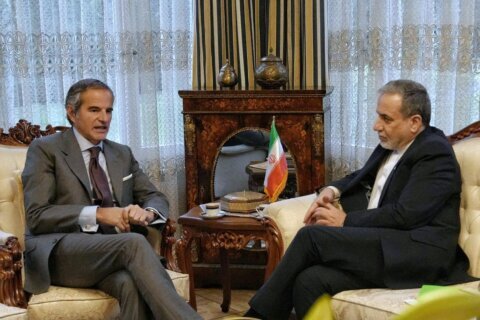JOHANNESBURG — As South Africa’s deputy president Cyril Ramaphosa bounded onto the stage at a Soweto community hall in November, supporters of the ruling party — alongside some of the country’s most powerful business leaders — hooted and cheered.
Loudspeakers blared a campaign song for Ramaphosa, who is vying to take over the leadership of the African National Congress when the party meets later this week. “Siyavuma!” the crowd sang along. “We agree!”
The ANC, the former liberation party of Nelson Mandela that has governed South Africa since the end of apartheid, is in a heated contest to choose a new boss. With just days to go until a five-yearly elective conference, candidates are pulling out all the stops in a race that is expected to have serious implications for the future of the party, and for South Africa.
While South Africans won’t head to the national polls until 2019, this is a de facto election year. Under the country’s parliamentary system, voters don’t directly elect their president, and so the choice within the ANC — the dominant party in every election since 1994 — is likely to become the next president of South Africa.
Around 5,000 delegates, representing branches of the ANC from around the country, will meet in Johannesburg from December 16 to 20 to cast their ballots. Their choice is especially important at a time when South Africa’s economy is barely growing, and the country has faced a raft of corruption scandals centered on state-owned enterprises, even reaching the highest levels of government.
“There is a need for fresh leadership to reinvigorate the flagging economy,” says Daniel Silke, a Cape Town-based independent political analyst. Should ANC members choose continuity, not change, investor confidence may be further rattled.
Jacob Zuma, the current president, has spent much of his eight years in office embroiled in scandals. He is currently facing the potential reinstatement of money laundering, fraud and corruption charges related to a 1999 arms deal (he denies the allegations). Zuma has also been accused of allowing wealthy family friends to influence cabinet appointments and unduly benefit from lucrative government contracts. These allegations were detailed in 2016 report by South Africa’s public protector, an independent ombudsman.
Under Zuma’s leadership, the ruling party has become increasingly polarized. Justice Malala, a leading political columnist, describes Zuma as a “wrecking ball” who has “poisoned” the ANC.
Meanwhile South Africa’s economy has slowed to a crawl. The country’s gross domestic product is expected to grow by just 0.7 percent this year, and official unemployment has risen to 27.7 percent, though it is even higher when “discouraged workers,” who have simply given up looking for jobs, are included.
Standard & Poor’s, a credit rating agency, recently downgraded government debt to “junk” status. Should Moody’s, another ratings agency, do the same, it would trigger the removal of South African bonds from key global indices. This in turn would mean higher borrowing costs, and prices could rise.
South Africa has a two-term limit for presidents; Zuma’s second one will end in 2019. Ahead of the upcoming conference, Zuma has sought to entrench his preferred successor — his ex-wife Nkosazana Dlamini-Zuma, a former cabinet minister and chairperson of the African Union Commission. Despite being a former spouse, they remain close and he has championed her bid for the presidency.
Ralph Mathekga, a fellow at the University of Johannesburg and the author of “When Zuma Goes,” says that supporters of Dlamini-Zuma are showing a “willingness to protect the status quo.”
Her main rival is Ramaphosa, a former union leader and successful businessman who returned to politics five years ago. Ramaphosa, says Mathekga, is considered pragmatic and business-friendly. Ramaphosa’s recent visit to Soweto, the former blacks-only township southwest of Johannesburg, was attended by the heads of investment firms and banks who came to hear him outline a plan for South Africa’s struggling economy.
It is unclear who will triumph at the December conference.
A survey conducted in August by Kantar TNS, a market research company, of 2,000 South Africans living in the country’s biggest cities found that only 18 percent thought that Zuma was doing a good job as president of the country. Among respondents, 36 percent supported Ramaphosa as the next president of the ANC, compared to 19 percent for Dlamini-Zuma.
Support for Zuma is thought to be somewhat higher in rural areas, in particular in KwaZulu-Natal province, where he is from.
Research by the Johannesburg-based Institute of Race Relations, analyzing branch nominations around the country, suggests that Ramaphosa is leading in the run-up to the conference. But analysts are hesitant to call a victory, warning of potential curve balls ahead.
Richard Calland, a governance expert based at the University of Cape Town, writes in the weekly Mail & Guardian that although Ramaphosa appears to have a significant lead, “there are very real concerns that delegates will be bribed or blackmailed by the pro-President Jacob Zuma faction between now and the conference.”
Mathekga says the ANC’s decision on its next leader will determine whether the liberation party can modernize and reform — this would include rooting out corruption — or protect Zuma and those around him. A victory by Dlamini-Zuma — viewed as entrenching a Zuma dynasty — could potentially see the ANC lose its majority at the 2019 polls, he says.
In contrast, a clear win by Ramaphosa and his supporters could lead to a “recall” of Zuma as the country’s president. The ANC’s national executive has the power to ask Zuma to step down — as it did to a previous president, Thabo Mbeki, in 2008. A caretaker president was then chosen by the party to serve out the remaining eight months of Mbeki’s term.
[MORE: The 10 Most Corrupt Countries, Ranked By Perception]
Such a move would require a decisive victory by Ramaphosa, otherwise “it will incredibly difficult to dislodge Zuma and his hold on power,” Mathekga says.
Some analysts are looking to the 2016 municipal elections for a glimpse of what could happen at a national level in 2019.
During the local polls, the ANC fell below 50 percent in several key cities including Johannesburg and Pretoria, the economic hub of the country — something previously considered “unthinkable,” says Mathekga. These cities are now being governed by coalitions led by the Democratic Alliance, the largest opposition party.
Should the unpopular Dlamini-Zuma become the ANC’s new leader, more voters may decide to abandon the party in the next election. This could potentially push the ANC below a 50 percent majority nationally — something never considered a possibility before — giving the opposition a chance to form a coalition and claim the presidency. It would be a stunning reversal of fortunes for a party that has dominated South African politics since the first democratic elections in 1994.
While the ANC has been dominant for 23 years, “it is becoming more vulnerable electorally,” Silke says. “The party can no longer be guaranteed of winning election after election. This conference will be an attempt by the ANC to right itself.”
More from U.S. News
Johannesburg Mayor Herman Mashaba Takes on the ANC
South Africa’s President Reinvigorates Questions About Land Ownership
South Africa’s Women Still Play Second Fiddle
South Africa’s Leading Party to Vote on its Leader and Future Presidential Contender originally appeared on usnews.com







